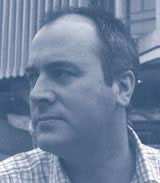Both you and your work should do the talking
Consultancies should communicate their own brand to clients more effectively and need to exhibit the self-belief of the ad agencies, says Jonathan Kirk

As an industry we are obviously used to advising our clients on how to achieve brand differentiation in their respective markets. However, we seem very slow to take our own medicine because most design consultancies are still notoriously undifferentiated.
Getting your consultancy’s own branding right is not easy. Understandably, time-pressured design groups often find it difficult to approach an internal project with the same rigour and discipline as they would a client one. Nevertheless, if you’re in the business of creating brand differentiation for others, it’s hardly going to inspire confidence if your own brand is lacklustre. Clearly, this is something that has to be got right.
Frequently, consultancies appear to suffer from a soundbite mentality. Their supposed big point of difference is usually mentioned on page one of the brochure, website or presentation, and then never seen again. How many times have you read the words ‘our unique approach’ only to search in vain for precisely what that might be?
Clients would also be forgiven for thinking that one copywriter had been given a job lot of consultancy websites because the language is repetitive, to say the least. Many industries develop a bland and impenetrable language all of their own, but it would be good to think that the creative design industry was an exception. Elements that were once seen as important points of difference – ‘strategic thinking, solving business problems, results-focused, big ideas’ – are now no more than the generic language of the market, a type of universal, industry ‘speak’.
The advertising industry generally does it better. Take M&C Saatchi’s superb clarity in its bold commitment to six principles, each one succinctly explained, or St Lukes’ proposition of ‘innovation through collaboration’. It may be easily said but it’s more than a soundbite. The promise is made real by a distinctive way of working that forms the heart of their offer.
And is it my imagination or do many advertising agencies show more passion for their subject than the average design consultancy? Take a look through the websites of leading ad agencies and what comes through very strongly is a real pride and belief in the power and effectiveness of advertising as a medium. By contrast, many consultancies seem almost ashamed of the word ‘design’.
So how can they achieve a real point of difference? Well, first of all, it isn’t just about words. It’s not a neat slogan that you then post-rationalise. Your brand positioning has to be the platform for everything that you do and it has to be real. In other words, promises are easily made but they have to be kept. Second, it’s about more than your creative work. Although it would be great to let the work speak for itself, it’s taken as a given these days that a consultancy’s creative output will be of a high standard. Therefore, points of difference have to come not just from finished work but from the consultancy’s attitude, approach, tone of voice, particular viewpoint on important issues which clients are facing, even a shared working style.
Third, many consultancies merely seem to communicate who they are, what they do and who they do it for. Unfortunately, by doing so they immediately position themselves in clients’ eyes as a purely functional design group with a shopping list of services. Where’s the added value? Where’s the ‘consultancy’? How about transforming this into – this is who we are, this is what we believe in, this is how these beliefs translate to a way of working, and this is how these beliefs and way of working benefit our clients’ businesses.
Finally, if you’re reading this believing that your company does have a strong point of difference, then try the elevator speech experiment. Imagine that you’re going to see the marketing director of a company for a new business meeting and you bump into the Chairman in the lift. You introduce yourself and he asks you what your company does. You’ve got 30 seconds to tell him. Not just tell him, but make sure that what you say is sufficiently distinctive that he will remember. What would you say?
It’s always an interesting exercise to ask your colleagues to write down their elevator speeches. You may think your colleagues share your views on your company, your approach and how you differ from your competitors, but you’d be surprised.
Jonathan Kirk is founder of marketing and business development consultancy 2Fruition Limited
-
Post a comment




